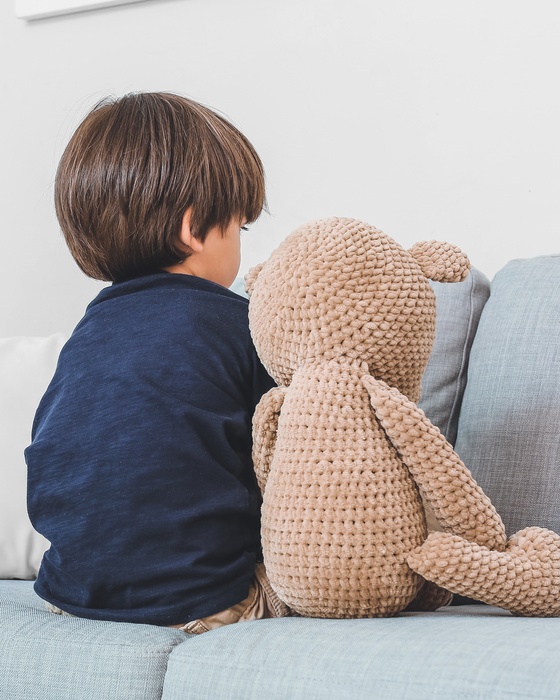
Children have a critical need for good mental health as they reach developmental and emotional milestones, gain social skills, and learn how to deal with life’s problems. The Centers for Disease Control and Prevention (CDC) describes mental disorders among children as changes in the way they behave, learn, or handle emotional trauma or strong emotions. Mentally healthy children function well in their homes, their learning environment and their community and display a positive quality of life.
What are the 5 most common mental disorders in children?
Anxiety, ADHD, behavioral problems, depression and PTSD are the most common mental disorders found in children, according to the CDC.
- Anxiety: Anxiety occurs when children do not outgrow typical fears or have so many fears that they interfere with school or home activities. Symptoms can include fear when away from parents (separation anxiety), extreme fear about a specific thing or situation, such as dogs, insects or going to the doctor (phobias), or fear of school and other places where there are people (social anxiety).
- ADHD: Attention-deficit/hyperactivity disorder (ADHD) is typically diagnosed during childhood and can last into adulthood. ADHD can be diagnosed when children are predominantly inattentive, predominantly hyperactive-impulsive, or a combination of inattentive and hyperactive-impulsive.
- Behavioral problems: Conduct disorder (CD) and oppositional defiant disorder (ODD) are common behavioral problems found in children. Children who show ongoing patterns of aggression or serious violations of rules or laws may be diagnosed with conduct disorder.
- Children with CD are more likely to be injured and have difficulties with peers. Symptoms can include breaking rules, such as running away, staying out at night when told not to or skipping school; being aggressive in ways that cause harm, such as bullying, fighting or being cruel to animals; lying; stealing; or damaging property on purpose.
- Children with ODD act out persistently, causing serious problems at home, in school or with other children. Children with ODD are more likely to act out around parents, teachers or other care providers. Symptoms can include constant anger, arguing with adults or refusing to comply with rules or requests, deliberately annoying others and blaming others for their own mistakes or misbehaviors.
- Depression: Depression is a persistent feeling of sadness or hopelessness. Symptoms can include feeling hopeless, sad, irritable, worthless or guilty. Changes in sleeping patterns, eating patterns or energy levels can indicate depression in children. Signs of self-injury or self-destructive behavior are also symptoms of depression.
- PTSD: Stressful events that affect how children think and feel can lead to post-traumatic stress disorder (PTSD). Children who experience severe stress from things like an injury, death of a family member or violence can be affected long term. The traumatic experience could happen to the child or be witnessed by them.
Symptoms can include reliving the event repeatedly in thought or in play; having nightmares and sleep problems; becoming very upset when something causes memories of the event; lacking positive emotions; experiencing intense, ongoing fear or sadness; feeling irritable and having angry outbursts; constantly looking for possible threats or being easily startled; acting helpless, hopeless or withdrawn; denying that the event happened; feeling numb; or avoiding places or people associated with the event.

What are the causes of disorders in early childhood?
According to the CDC, the exact causes of mental disorders in early childhood are not known, but several factors may play a role. However, some children are more likely to show symptoms of anxiety or depression when they experience severe trauma or severe stress. Maltreatment, bullying and genetic factors can also contribute to the development of mental disorders in children.
It is also unknown why some children who experience stressful or traumatic events develop PTSD while other children do not. Experts believe many factors, including temperament and biology, may influence this.
The exact cause of behavioral disorders in children is also unknown, but experts believe it is likely a combination of environmental and genetic factors. A child’s personality and temperament can contribute to conditions like ODD and CD. Some children who experience mental disorders also have parents with mental disorders or substance use issues.
What are the early signs of mental illness in children?
Serious changes in the way a child typically learns, behaves or handles their emotions are early signs of mental illness in children. The National Alliance on Mental Illness (NAMI) lists several warning signs to watch for:
- Decreased interest in activities: A child developing a mental illness may display decreased interest in things like creating art, playing with friends, reading or exploring their environment. They may become more isolated, create distance with peers and show a general disinterest in things they love. These signs can indicate a deeper struggle within children.
- Fights with loved ones: A child developing a mental illness may pick fights with adults or peers as they take out their newfound anger and emotions on those closest to them.
- Mood swings: Extreme mood swings may indicate a developing mental illness in a child. Pay attention to the potential causes and cycles of the mood swings. Understanding the possible causes and nature of the mood swings can help a provider determine whether it is a mood disorder, trauma-related or just normal childhood experiences.
- Lack of communication: Problems with communication can be difficult to discern in children as they are in the process of developing that skill set. A noticeable lack of or issue with communication could be a sign of mental illness. Children who start sharing less than before about their feelings, friends or school would be an example.
- New fear of things: Children who are typically fearless who suddenly are too scared to try anything new may be displaying a deeper issue of anxiety. This is especially true if they develop fears of everyday activities they were previously used to doing.
- Isolation: If a child who is usually outgoing and makes friends easily starts isolating themself more than usual, they could be showing signs of a developing mental illness.
There can also be telling signs by age.
Babies, toddlers and preschool-aged children get upset easily and often, which is a completely normal reaction for their developmental stage as their brains are still growing and learning to take in new information. Because of this, they can be easily overstimulated and crave control, causing an outburst if they don’t get it. But if kids in this developmental stage are more often than not distressed, aggressive or abnormally fearful, it can be a sign that they’ve suffered a traumatic experience that could lead to larger mental health issues.
Kids in elementary or middle school may also experience mental health issues after traumatic experiences or big changes in their life. However, they are more likely to hide their feelings than younger kids or show their symptoms through behavioral challenges.

How to support a child with mental health issues?
Early detection and intervention for childhood mental illness are critical because mental health conditions often worsen without treatment. NAMI reports that raising a child with a mental health condition can be very challenging, but there are ways to make it easier.
Schedule an appointment with a licensed psychiatrist or psychologist or with your child’s pediatrician or primary physician if you believe your child is exhibiting symptoms. Providing your health professional with as much detail as possible on your child’s moods, behaviors and emotions can help in the diagnosis.
Be persistent. If a licensed provider does not offer a diagnosis or referral to another professional, you should question it and consider their reasoning. If you disagree, trust your instincts and get a second opinion. It is better to be cautious than to ignore a potentially serious problem.
Steps to continue helping a child:
- Work with your child: Avoid getting angry at your child for behaviors that are not under their control. This does not mean you cannot impose discipline, but you must set your expectations in consideration of your child’s mental health. Understand that people who develop mental health conditions may never be the same as they were before. Expecting the same standards of behavior from prior to the onset of their mental health condition will only cause frustration and stress.
- Learn all that you can: Educate yourself as much as possible about your child’s mental health condition. NAMI offers information about specific mental health conditions and treatment options that will help you make informed decisions.
- Communicate with your child’s school: Children dealing with mental health conditions may struggle in school without assistance. Fortunately, schools are required by law to provide special services and accommodations to children with mental health conditions that interfere with their education. Learn as much as you can about how to acquire necessary educational services.
- Take care of yourself: The stress of raising a child with a mental illness can contribute to mental health challenges for a parent. Do not hesitate to seek treatment if you begin to feel that you are struggling with sadness or anxiety. Ensure that you are healthy enough to care for your child and can serve as a model of mental well-being for them to follow.
- Take care of your family: Other children in the family may resent the amount of attention being placed on their sibling’s mental health challenges. Spend time with each of your children, and make sure they understand what their sibling may be going through. A happy and balanced family can reduce stress levels for everyone, which can help alleviate mental illness symptoms.
If you have concerns about a child’s behavior, there are many local resources available to you. Heart of Iowa Community Services (HICS) provides coordination and financial support for mental health and disability services to residents in Adair, Adams, Audubon, Clarke, Dallas, Decatur, Guthrie, Lucas, Marion, Ringgold, Taylor, Union and Wayne counties in Iowa.
Learn more about the resources and service coordination available for children through HICS here.
